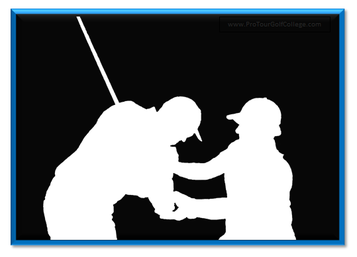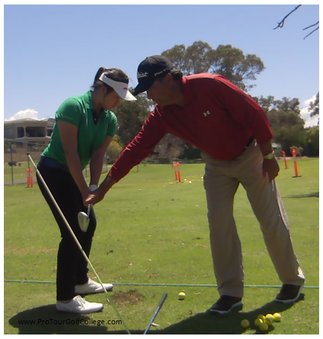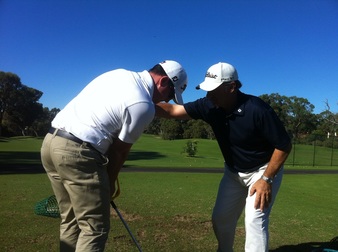"Like the medical field has general practitioners and specialists, the golf instruction industry also has ‘G.P’s’ who give lots of lessons to average golfers (and they are usually very good at it) and specialist golf instructors who focus on, and have carved a niche working with advanced and elite level golfers".  One of the biggest and most consistent challenges you will face becoming an advanced level golfer is to continually find ways to improve your game. This is easier said than done because you have to keep a steady focus - not just on your performance on the golf course, but also the work you’re performing on the practice fairway. If your scoring average is 80, or better, then it’s fair to say that you are an advanced golfer, and if you haven’t worked it out already you soon will; golf gets a lot tougher as your golf score average gets lower. This as I mentioned is a challenge that requires much more than just taking golf lessons to improve your golf swing technique. Golf swing lessons are very helpful for higher handicap golfers who will definitely see benefits in taking lessons from a competent golf instructor. Here’s the problem; if you have designs on becoming a top level amateur or professional golfer you need to find a golf instructor who has specialized knowledge and lots of experience working with advanced amateur golfers, and a successful track record taking his students to much higher levels of achievement. My partner at Pro Tour Golf College David Milne (pictured below) has coached two of his students to number one amateur in the world. He coached them from junior golfers all the way through to the pro tours and has consistently been able to get the most out of his students in terms of continually improving their golf score average for well over 20 years.  Like the medical field has general practitioners and specialists, the golf instruction industry also has ‘G.P’s’ who give lots of lessons to average golfers (and they are usually very good at it) and specialist golf instructors who focus on, and have carved a niche working with advanced and elite level golfers. When you seek out a golf instructor for an instruction program you need to find out how long the golf instructor has been teaching professionally. If the golf instructor has been teaching professionally for less than three years you should probably keep looking as it will be helpful to find a golf instructor who has been continuously teaching all levels of golfers professionally for a period of at least five to ten years. Why? Like experts in most fields, there is an element in the success formula that arrives only after many hours of trial and error, study and experience; that results in a detailed golf lesson map with lots of choices and strategies for generating continuous improvement in their students. Specialist golf instructors offer many more options. There's an old saying in the golf teaching game that goes like this; "a good teacher has a method, but a great teacher has many". If the golf instructor works at a driving range and rarely if ever teaches short-game skills and golf course skills, then keep looking. If the golf instructor runs or works in a golf shop and on average does less than 10 hours of lessons per week then keep looking. If you’re investing time, effort and money and your game is not progressing steadily, then it’s time for a change. You are entitled to a return on investment and as you get to lower scores you need to realize that there’s a kind of law of diminishing returns that kicks in where it seems the more effort you put into improving your game, the less improvement you experience. It is particularly important to seek out specialist golf instructors if you have hit a wall with your game and haven’t moved the improvement dial along the scale for a while.  This can be an extremely frustrating time in your golf development and you might have to travel many miles to work with a specialist golf instructor to help you deal with this and other challenges, but it will be worth it. Keep in mind that if you want to become a top level golfer it will also be helpful to work with an instructor who can - or has played at a high level. This is not nearly as important for teaching average golfers, where a golf instructor who has lowered his/her handicap to single figures will be good enough to help the majority of amateur golfers. If you possess a low single digit handicap an instructor who was a top level amateur golfer or played professionally before they decided to take the path of becoming a specialist teaching professional will be very beneficial to you. The majority of PGA and LPGA trained golf instructors are golfers who have turned professional only after becoming competent amateur golfers. In fact in Australia, the UK, Canada and the US you cannot start training as a PGA golf professional until your reach a low single digit handicap. From there you become an assistant professional and you work under a senior golf professional for 2 to 3 years. If possible look for PGA instructors who have worked under well-known golf instructors because they have been continually exposed to up to date golf teaching practices, and they have usually given lots of lessons. For example, a friend of ours Jim McLean has successful golf schools around the USA and overseas and his golf instructors are very well trained because Jim sets very high standards for his golf instructors, and continually works with them on their communication and their golf teaching skills. To continually improve your golf is the biggest challenge you will face as a motivated and ambitious golfer, so it makes good sense to invest your time, effort and money working with golf instructors who can support and nurture your golf skills and help you to smash through the golf performance wall to lower scores and success playing golf. If improving your golf is important to you, then it is equally important for you to carefully choose the golf instructor with whom you work with. This will be advantageous to you in the long run working with a golf teaching specialist who can help you to live your dream of becoming a top level amateur or professional golfer. Lawrie Montague and David Milne - Pro Tour Golf College Your Success On Tour is Our Business
Andrew
12/8/2013 12:08:10 am
Great post, It is my belief that the first lesson with an instructor should be to go out on the course and play a round of golf with them. Then the instructor can assess where you are losing strokes and the best and quickest things to "work on" to improve your score, not your swing. I went to an instructor once a month for a year, my scores did not improve my swing did marginally. 13/8/2013 12:25:34 am
Andrew thanks so much for your comments and your support and I completely agree with you that the golf course assessment is the best place to start. Comments are closed.
|
Archives
June 2019
|
Proudly Supported By
Copyright © 2011 - 2018 Pro Tour Golf College
Website Managed By Golf Performance Media
All Rights Reserved
Website Managed By Golf Performance Media
All Rights Reserved


 RSS Feed
RSS Feed



